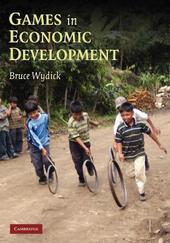
|
Games in Economic Development
Paperback / softback
Main Details
| Title |
Games in Economic Development
|
| Authors and Contributors |
By (author) Bruce Wydick
|
| Physical Properties |
| Format:Paperback / softback | | Pages:314 | | Dimensions(mm): Height 256,Width 174 |
|
| Category/Genre | Development economics |
|---|
| ISBN/Barcode |
9780521687157
|
| Classifications | Dewey:338.9001/5193 338.90015193 |
|---|
| Audience | | Tertiary Education (US: College) | | Professional & Vocational | |
|---|
| Illustrations |
3 Tables, unspecified
|
|
Publishing Details |
| Publisher |
Cambridge University Press
|
| Imprint |
Cambridge University Press
|
| Publication Date |
24 December 2007 |
| Publication Country |
United Kingdom
|
Description
Games in Economic Development examines the roots of poverty and prosperity through the lens of elementary game theory, illustrating how patterns of human interaction can lead to vicious cycles of poverty as well as virtuous cycles of prosperity. This book shows how both social norms and carefully designed institutions can help shape the 'rules of the game', making better outcomes in a game possible for everyone involved. The book is entertaining to read, it can be accessed with little background in development economics or game theory. Its chapters explore games in natural resource use; education; coping with risk; borrowing and lending; technology adoption; governance and corruption; civil conflict; international trade; and the importance of networks, religion, and identity, illustrating concepts with numerous anecdotes from recent world events. Comes complete with an appendix, explaining the basic ideas in game theory used in the book.
Author Biography
Bruce Wydick is Professor of Economics at the University of San Francisco, where he has taught since 1996, after completing his Ph.D. at the University of California at Berkeley. His research focuses on applications of game theory as well as empirical and experimental methods to poverty and development issues, especially to microfinance. Professor Wydick has published over a dozen articles in academic journals such as the Journal of Development Economics, Economic Development and Cultural Change, World Development, and the Economic Journal and has received grants and awards for his research from USAID, the Jesuit Foundation, the McCarthy Foundation, and the Pew Charitable Trust. He is co director of the master's program in international and development economics at the University of San Francisco, has served as a consultant on a number of research projects of the World Bank, and is actively involved in both field research and development work in the highlands of western Guatemala.
Reviews'Games in Economic Development presents a unified view of the difference between the rich countries and the third world. The rich countries have institutions that counteract many different co-ordination failures that plague the third world. Bruce Wydick explains those failures theoretically, and he illustrates them beautifully with many colorful and convincing examples. Some of these are from his own experience in Guatemala. Yes, this is what economic development is all about.' George Akerlof, Nobel Laureate in Economics, 2000, University of California at Berkeley 'Drawing from a voluminous literature, this book illustrates a number of important economic concepts with simple game theory examples. The tone is student-friendly, the presentation insightful and entertaining ... an excellent companion to courses in the economics of development and institutional change, and relevant reading for development practitioners.' Marcel Fafchamps, Oxford University 'Game theory explains how rational, far-seeing individuals left to their own devices may fail to achieve social rationality. The emergence of game theory shifted the focus of development economics from relationships of production to relationships among people. Bruce Wydick's book provides a lively introduction to the game-theoretic perspective on economic development. Telling examples explain why public school teachers in poor countries are so often absent, why deworming programs that could make everyone better off fail, why rational farmers may adopt the wrong technology, and how corruption becomes entrenched. A broad and up-to-date survey of patterns of interaction that contribute to the persistence of poverty or create an escape hatch.' Karla Hoff, Senior Research Economist, The World Bank 'In Games in Economic Development, Bruce Wydick begins to bring to life the academics of game theory with the practicalities of economic development in the field. The work provides practitioners with a fresh and relevant framework for evaluating dilemmas faced in the field of economic development and comprehending options for interventions. It breaches the divide between academic theory and practical development issues in a way that sheds understanding and clarity to the discussion of the subject.' Jim Reiff, CEO - Growing Opportunity Finance (India), member of the Opportunity International Network 'This a clear, engaging and thoughtful text. But in Games in Economic Development, Wydick also makes an important and controversial argument. The fundamental origins of development and underdevelopment are not to be found in variations in natural or human resources or in exploitative international economic interactions, but rather in the institutions and social norms that have facilitated economic growth in some societies and undermined it in others. Wydick makes this case primarily through the use of theoretical arguments, explaining and using the tools of simple game theory to shed light on wide range of vital questions in development economics. This is an exciting intellectual program, well-summarized in this book.' Chris Udry, Yale University
|